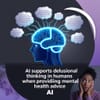The use of artificial intelligence (AI) in mental health support is a rapidly evolving field that holds both promise and concern. While AI-powered systems can enhance diagnosis accuracy, personalize treatment, and increase accessibility to care, recent research suggests that generative AI and large language models (LLMs) can sometimes support delusional thinking in humans when providing mental health advice.
This raises important questions about the limitations and potential risks of relying solely on AI for mental health support. AI tools lack the emotional understanding and empathy that human therapists provide, which is crucial for effective therapy. Furthermore, AI systems require sensitive personal data, raising concerns about data.
The future of AI in mental health will depend on developing tools that complement human therapy, rather than replacing it. By prioritizing human-centered design, ensuring robust data protection measures, and implementing safeguards to prevent reinforcing delusional thinking, AI can be a powerful tool for improving mental health care. Ultimately, the key to successful AI-driven mental health support lies in striking a balance between technological innovation and human empathy.


